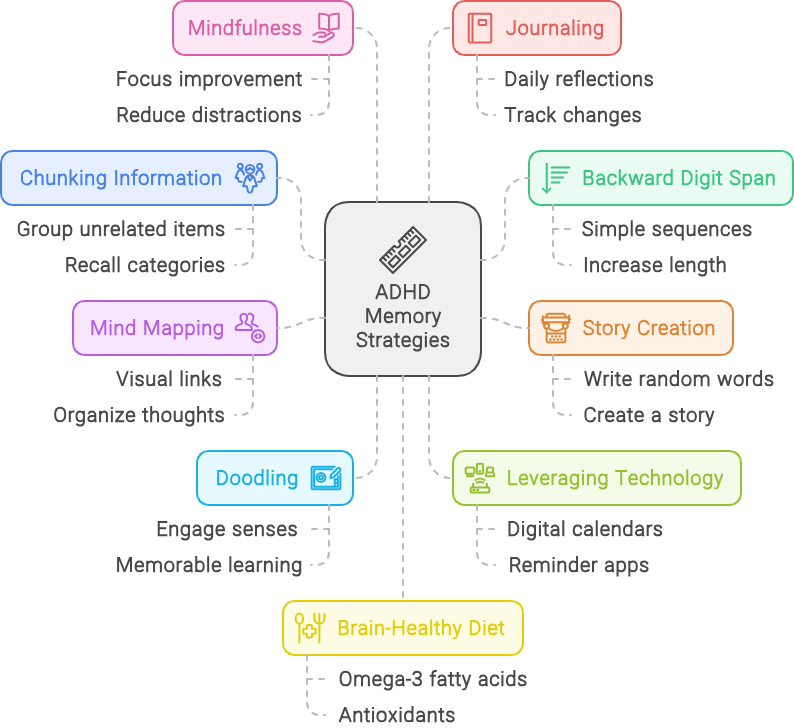ADHD Memory Strategies: 13 Effective Techniques for Women

ADHD and memory challenges can significantly impact women's daily lives, from managing tasks to maintaining relationships and performing well at work. However, there are proven strategies that women with ADHD can use to enhance their working memory and manage memory-related difficulties.
Here are 13 ADHD Memory Strategies for You to Try To Help With Your Working Memory

Chunking Information
Chunking involves grouping related items together, reducing cognitive load, and making information easier to remember.
Activity: Write down a list of 10 unrelated items, like "apple, car, book, flower, chair, dog, ocean, pen, tree, hat." Group them into categories (e.g., apple, flower, tree = plants; car, chair, hat = objects). First, recall each category, then recall the items within each category.
Does It Work? Chunking helps by easing the brain’s processing load, making it an effective strategy for improving working memory. Though the benefits might be specific to practiced tasks, it’s a useful technique for day-to-day memory management.
Backward Digit Span
This cognitive exercise involves recalling sequences of numbers in reverse order.
Activity: Start with a simple sequence like 3-7-4. Recall the numbers in reverse order (4-7-3). Increase the length of the sequence as you become more comfortable.
Does It Work? This exercise is well-known for enhancing working memory, particularly for tasks involving numerical information, although its impact on everyday memory may vary.
Story Creation with Random Words
Creating a story with random words aids memory by forming associations.
Activity: Write down 5-7 unrelated words (e.g., "balloon, tiger, umbrella, mountain, clock"). Create a short story using these words. Try to recall the story and words after a few hours or the next day.
Does It Work? Story creation encodes information more effectively through associations, strengthening working memory, especially for verbal tasks.
Mind Mapping
Mind mapping involves creating visual representations to organize thoughts and reinforce memory by linking new information to existing knowledge.
Doodling or Sketchnoting
When learning new information, doodling or sketchnoting can help retain details by engaging multiple senses, creating a more memorable learning experience. Leverage Technology
Using digital calendars, reminder apps, and alarms can help manage daily tasks and appointments. These tools provide external prompts and help organize information, compensating for working memory lapses.
Practice Mindfulness and Meditation
Mindfulness enhances focus and attention, supporting working memory. Meditation improves cognitive function and reduces distractions, making it a valuable tool for memory enhancement.
Keep a Journal
Writing daily reflections or to-do lists can consolidate memories, supporting both short-term and long-term memory. Journaling also helps track cognitive changes over time.
Adopt a Brain-Healthy Diet
A diet rich in omega-3 fatty acids, antioxidants, and vitamins promotes brain health. Foods like fatty fish, nuts, berries, and leafy greens are particularly beneficial for cognitive function and memory.
Engage in Regular Exercise
Physical activity boosts blood flow to the brain, improving cognitive function and memory. Regular exercise also helps manage stress, which can negatively impact working memory.
Develop Routines
Establishing consistent routines reduces the cognitive load on working memory. Placing items like keys and wallets in the same spot daily minimizes the chances of forgetting them.
Do Working Memory Strategies and Techniques Work?
Research on working memory training shows mixed results. Some studies suggest short-term improvements in specific tasks, but these gains may not transfer to broader cognitive functions or everyday life. The sustainability of these improvements often requires continued practice.
However, neuroplasticity—the brain's ability to adapt—offers hope. Working memory training and other treatments like medication or behavioral therapy may yield lasting cognitive benefits. Tailoring training to individual needs and integrating it into a comprehensive ADHD management plan can enhance its effectiveness.
Wrapping It Up
Implementing ADHD memory strategies can significantly improve working memory and reduce forgetfulness in women with ADHD. By incorporating these techniques into daily life, women can better manage memory deficits and enhance their overall cognitive functioning.


